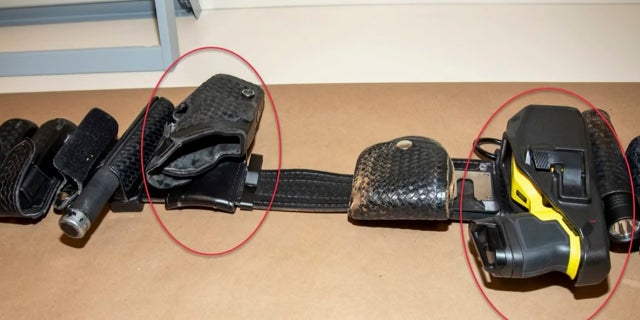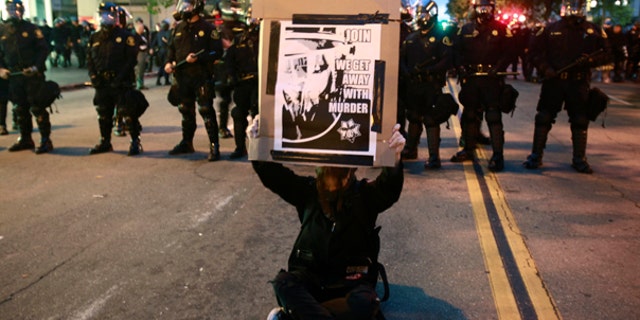Kim Potter trial: Experts sound off on mistaking handgun for Taser

The trial of former Minnesota police Officer Kim Potter, who is facing manslaughter charges in the shooting death of Daunte Wright
MINNEAPOLIS – Witness testimony is underway in the manslaughter trial of former Brooklyn Center, Minnesota, police Officer Kim Potter in the death of Minneapolis 20-year-old Daunte Wright, renewing attention over the debate of police use of force and raising questions about how an officer could mistake a handgun for a Taser.
“Every Taser course I know of emphasizes making sure you don’t inadvertently pull one when you need the other,” said David Katz, a former senior special agent with the Drug Enforcement Administration and the founder and CEO of Global Security Group. “That is why most departments use the Taser in a cross-draw position, which is separate from the strong-side holster for the regular firearm.”
Betsy Brantner Smith, a retired sergeant and spokesperson for the National Police Association, said the cross-draw position is meant to reduce risks, but mistakes still happen.
This image provided by the prosecution shows Officer Kim Potter’s duty belt as the state delivers its opening statement before Hennepin County Judge Regina Chu Wednesday, Dec. 8, 2021. Potter, a former Brooklyn Center Police officer, is on trial in the April 11, 2021, death of Daunte Wright.
(Court TV via AP, Pool)
“This type of error happens,” she said. “She’s not the first one and likely will not be the last to have these errors occur. They are few and far between, but they occur.”
Katz questioned the usefulness of having a Taser shaped like a handgun to begin with and suggested altering future products to make them easily differentiated. One possibility would be building them with thumb triggers, he said.
“The tactile sense would be made completely unique,” he said.
Brantner Smith said that any alterations in the design of Tasers for law enforcement use would have to consider a few factors. The pistol grip is useful, she said, because it allows officers to retain a Taser in their hand if someone tries to disarm them. They also need a stun gun that they can quickly get in and out of a holster.
Wright died on April 11 after a traffic stop in Brooklyn Center, outside Minneapolis.
Potter, a field training officer at the time, attempted to stop Wright from fleeing after body camera video shows he broke free from Officer Anthony Luckey, a trainee, during an arrest attempt and got into the driver’s seat of his vehicle.
She shouted “Taser” multiple times but drew a handgun and fired it into Wright’s body from a few inches away. The car crashed a short distance up the road, and Wright died from his injuries.
Potter’s defense team is arguing that the shooting was an accident, and harrowing body camera video shows the shooting and its aftermath, in which Potter appears distraught after realizing what happened.
In this screen grab from police video, prosecutor Erin Eldridge shows evidence from the traffic stop of Daunte Wright as she delivers the state’s opening statement in the trial of former Brooklyn Center Police Officer Kim Potter.
(Court TV via AP, Pool)
“It’s her rookie, her recruit, that is making that initial arrest, and he’s doing it wrong,” Brantner Smith said of the initial encounter. “So, she’s got a process that she watches that makes sure that the rookie doesn’t get hurt.”
That could have been mentally taxing, Brantner Smith said, noting Potter only had a few seconds to act.
“The role of being a field training officer — and I did it for many, many years — is an extremely stressful one,” Brantner Smith said. “Because you’re not only paying attention to yourself and your own activities, but you are constantly evaluating and watching that recruit that you are training.”
With Wright struggling, Luckey and another officer, Sgt. Mychal Johnson, were leaning into the vehicle trying to stop him.
- Image 1 of 2
In this image taken from police video played during the trial of former Brooklyn Center Police Officer Kim Potter, Potter, on ground, reacts after the traffic stop of Daunte Wright April 11, 2021. (Court TV via AP, Pool)
- Image 2 of 2
In this image taken from police video played during the trial of former Brooklyn Center police Officer Kim Potter, Potter, right, is seen after the traffic stop of Daunte Wright April 11, 2021. (Court TV via AP, Pool)
Potter shouted a warning to Wright.
“I’m going to tase you,” she twice says in the video. But instead, she shoots him once.
“I grabbed the wrong f—— gun,” she then says, followed by, “Holy s—, I just shot him.”
Experts estimated to The Associated Press that instances in which officers mistake their handgun for a Taser happen less than once per year. According to an article in Americans for Effective Law Enforcement, there have been nine documented instances since 2001.
Posters stand on the south lawn Tuesday, Nov. 30, 2021, at the Hennepin County Government Center in Minneapolis before the trial of former suburban Minneapolis Police Officer Kim Potter.
(AP Photo/Jim Mone)
A similar incident happened in St. Louis, Missouri, in 2019. And in Tulsa, Oklahoma, in 2015, a sheriff’s deputy named Robert Bates said he mistook his firearm for his Taser and fatally shot Eric Harris, a Black man who was not armed.
Bates was sentenced to four years behind bars for a second-degree manslaughter conviction but was released after 1.5 years, Tulsa World reported.
And roughly six years earlier, transit cop Johannes Mehserle was responding to a report of a fight inside an Oakland, California, train station early New Year’s Day 2009, when he shot and killed Oscar Grant, 22, while the unarmed man was lying on the ground.
A demonstrator holds a sign in front of a moving police line in Oakland, Calif., after a guilty verdict for Johannes Mehserle. The former San Francisco Bay Area Rapid Transit police officer was found guilty in Los Angeles for shooting unarmed black man Oscar Grant on New Year’s Day 2009 at a BART station in Oakland.
(AP)
Mehserle said he had meant to grab his stun gun. He was ultimately found guilty of involuntary slaughter. The police department ultimately paid Grant’s family $2.8 million.
As for the 2021 shooting death of Daunte Wright, Potter is facing charges of first- and second-degree manslaughter. She could be sentenced to up to fifteen years in prison if convicted of the most serious count.
Prosecutors have already indicated their plans to try for a longer sentence.
Source: Read Full Article






